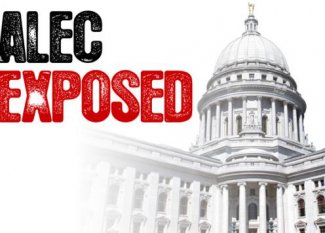The American Legislative Exchange Council (ALEC), as covered previously by DeSmogBlog, is the “Trojan Horse” behind mandating that climate change denial (“skepticism,” or “balance,” in its words) be taught in K-12 classrooms.
Well, ALEC is at it again, it appears. Facing an IRS complaint filed by Common Cause, one of the leading advocacy groups working to expose the corporate-funded bill mill, ALEC has also launched an assault on renewable energy legislation, according to a well-documented report written by Bloomberg News.
The two developments are worth unpacking.
Common Cause IRS Complaint
The Washington Post reported that on April 23, Common Cause “had filed an IRS complaint accusing ALEC of masquerading as a public charity…while doing widespread lobbying.”
ALEC is trying to brush aside this complaint, but Common Cause presents a compelling case.
“It tells the IRS in its tax returns that it does no lobbying, yet it exists to pass profit-driven legislation in statehouses all over the country that benefits its corporate members,” said Bob Edgar, president of Common Cause, in a statement. “ALEC is not entitled to abuse its charitable tax status to lobby for private corporate interests, and stick the bill to the American taxpayer.”
Common Cause wants the IRS to complete a no-holds-barred audit of ALEC’s work and to examine whether it violated IRS laws.
The complaint doesn’t come out of thin air. Quite to the contrary, actually.
“Common Cause said its complaint was based on more than 4,000 pages of ALEC records, including talking points that ALEC workers provided to lawmakers in order to better argue on behalf of the legislation the group develops,” explained The Post.
Attempt to Dismantle Renewable Energy Development Legislation
ALEC is also head-deep in promulgating fossil fuel industry-authored model legislation to dismantle, with one fell swoop, legislation promoting clean energy development.
“Nowhere else can you get a return that high,” ALEC has said on one occasion of the structure it has created to influence statehouses nationwide, referring to it as “a good investment.” A good investment indeed, particularly for fossil fuel corporations trying to take down a clean energy industry poised for rapid growth.
Bloomberg explains that dozens of states already have renewable energy mandate legislation: “Twenty-nine states and Washington, D.C., now have mandates, which, by requiring utilities to purchase energy derived from renewable sources, have helped provide a market for clean-energy technologies.”
Those programs, though, are now under severe attack by ALEC and the Grover Norquist-run Americans for Tax Reform.
“Opposition to the mandates coincides with the expiration of some federal incentives for renewables – many contained in the 2009 stimulus legislation. The repeal or weakening of state standards puts at risk an industry still dependent on government aid to compete with dirtier but cheaper fossil fuels…,” wrote Bloomberg.
Todd Wynn, meanwhile, head of ALEC‘s Energy, Environment, and Agriculture Task Force said that the corporate patrons of the Task Force have “expressed concern on the cost of renewable energy,” a statement steeped in irony, given the amount of subsidies that flows to fossil fuel corporations on an annual basis, drastically trumping the amount of money renewable energy resources receive.
Corporate lobbyist members of the Task Force include the likes of representatives from Peabody Energy, American Coalition for Clean Coal Electricity (ACCCE) and BP America, according to SourceWatch. No surprises here, of course: King Coal and Big Oil would like to see nothing less than a vibrant renewable energy sector.
Part Two Looming, Fracking the Centerpiece
In part two of this series, DeSmogBlog will cover the ALEC‘s (and some important friends’) fight, serving as a front for multinational corporations like ExxonMobil and friends, for fracking chemical fluid disclosure bills, as uncovered recently by The New York Times and ProPublica.
It sounds like a noble fight by ALEC and its allies. That is until one realizes that these model bills are rife with loopholes and similar secrecy that has made the industry infamous to begin with vis-a-vis the “Halliburton Loophole” inserted into the 2005 Energy Policy Act by then Vice President Dick Cheney’s Energy Task Force.
DeSmogBlog has new details of its own on this front.
Stay tuned…
Subscribe to our newsletter
Stay up to date with DeSmog news and alerts






